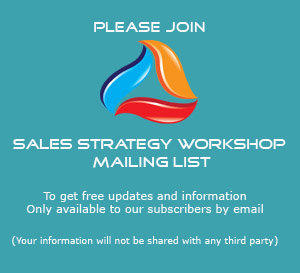Podcast: Play in new window | Download (Duration: 19:11 — 17.6MB) | Embed
In this podcast, we look at part two of the sales process. A good sales process is essential because the selling profession is both an art and a science. The science is in the process. The art is in how you execute that process to help them believe that you are the one they should be doing business with.
- How do you gain the prospects’ confidence?
- How do you know when it’s time to close?
- How do you know what they need to make the buying decision?
- How will they see you as the right person to do business with?
- How do you help them believe that your company can help them reach their objectives?
The key to answering all these questions and more is how well you execute your sales process.
Pre-presentation Sales Activity
The pre-presentation sales activity section of your sales process is for developing the strategies and tactics you will employ before you meet with the prospect. They will fall into two main categories.
Your strategy for contacting and setting the appointment includes:
- Your strategy for contacting and setting the appointment.
- Pre-call planning before every sales call.
Appointment Setting, The Telephone
Process means preparation, so before you pick up the phone, know what you are going to say. This allows you to be prepared for whatever direction the conversation takes, or what the prospect might say.
Process means preparation, so before you pick up the phone, know what you are going to say. This allows you to be prepared for whatever direction the conversation takes, or what the prospect might say.
To prepare, I would highly suggest you develop a script. I’ll take it a step further and say you develop several scripts. Every time I mention this to a group of salespeople, someone always stands up to say they don’t like reading from a script. This isn’t a script that you are going to read to the prospect. They’re scripts you’ll use to develop your message, hone your prospecting skills, and an understanding of the objections you may encounter.
When developing your scripts, make sure that each has the following three parts:
- Introduction
- The message
- The call to action

In this podcast, we look at part two of the sales process. A good sales process is essential because the selling profession is both an art and a science. The science is in the process. The art is in how you execute that process to help them believe that you are the one they should be doing business with.
- How do you gain the prospects’ confidence?
- How do you know when it’s time to close?
- How do you know what they need to make the buying decision?
- How will they see you as the right person to do business with?
- How do you help them believe your company can help them reach their objectives?
The key to answering all these questions and more is how well you execute your sales process.
Pre-presentation Sales Activity
The pre-presentation sales activity section of your sales process is for developing the strategies and tactics you will employ before you meet with the prospect. They will fall into two main categories.
Your strategy for contacting and setting the appointment includes the following:
- Your plan for getting and setting the appointment.
- Pre-call planning before every sales call.
Appointment Setting, The Telephone
Process means preparation, so know what you will say before you pick up the phone. This allows you to be prepared for whatever direction the conversation takes or what the prospect might say.
To prepare, I would highly suggest you develop a script. I’ll take it a step further and say you develop several scripts. Whenever I mention this to a group of salespeople, someone always says they don’t like reading from a script. This isn’t a script you will read to the prospect. They’re scripts you’ll use to develop your message, hone your prospecting skills, and an understanding of the objections you may encounter.
When developing your scripts, make sure that each has the following three parts:
- Introduction
- The message
- The Call to Action
Email Follow Ups
You may include a series of emails in your prospecting process before or after each call. If so, create an email template for each possible email. These templates are models and should have space to personalize the message to the recipient. Your emails could consist of the following:
Here are three examples of the types of emails that could consider after the first contact:
- Confirmation when an appointment is set
- Follow up for when no work is set, but they are still a viable prospect
- Follow-up email the day before the appointment date with additional information that could be helpful in the sales process.
Here are things to keep in mind when writing sales emails.
- Keep it short. Get to the point. Most of us read our emails on smartphones, so the subject line and the first two sentences are critical.
- Try using the subject line as a summary and include your and your company’s names.
- Always limit the number of topics in an email to one.
- Check your spelling and grammar.
- As I said before, develop a template.
I also found some articles you might want to check out related to business emails.
From Freelance Switch, “Writing Email Copy That Turns Into Sales“
And from About .com Sales “Quick Tip: Email Subject Lines“
Pre Call Planning
One area of the sales process I feel is the most neglected is pre-call planning. Pre-call planning provides you with three benefits:
- It provides you with a repeatable process for planning each sales call.
- It Improves the outcome of the sales call.
- It allows you to better prepare for the sales call.
I hope you enjoy this podcast and that you come back for more.
Our Next Podcast
In our next podcast, we examine the value of following a sales process for your presentations, I hope you enjoy it.
Sales Process For Your Presentations Stages 1 – 4
Visit Sales Management Workshop Podcast
If you have a chance, check out Sales Management Workshop. The podcast and blog provide sales management information to anyone responsible for leading a sales team.
The Sales Management Workshop podcast, covers topics like:
- Sales Planning
- Territory development
- Coaching your sales team
- Hiring
- Training and more
Sales Management Workshop Podcast On iTunes
You can find the Sales Management Workshop Podcast at http://www.salesmanagementworkshop.com/ or follow this link to Sales Management Workshop Podcast in the Apple iTunes Store, and it's free.
Sales Management Coaching Services
I provide Sales Managers with the support they need to succeed. Sales management coaching is more than training; coaching can be transforming. Our sales management coaching program focuses on change, goal attainment, and personal development. Follow the link to learn more about Michael Carter Coaching Services.



